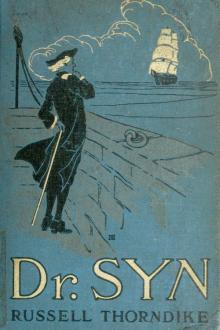Doctor Syn - Russell Thorndyke (new reading txt) 📗

- Author: Russell Thorndyke
- Performer: -
Book online «Doctor Syn - Russell Thorndyke (new reading txt) 📗». Author Russell Thorndyke
The captain spoke first.
“Doctor Syn, you heard me say at that inquiry yesterday that I was no strategist, that I was only a fighter.”
“I did,” returned the cleric.
“I know everything inside, outside, and aroundabout a ship, but I don’t know much else, and certainly nothing else thoroughly, so to speak. But I have seen other things in my time, for all that, just as any one who travels is bound to see things, and, just as any one else that travels, I have remembered a few things outside my business, just a few; the rest I’ve forgotten. Now you’re different from that, for you’re a scholar and have travelled widely, too, and a man who can use his book knowledge with what he comes in contact with in the world is the sort of man who might perhaps explain what’s bothering me at the present moment, for I am dense; you are not.”
“What is bothering you. Captain? Of course something to do with these murders that are uppermost in our minds?”
“Something, I dare say,” replied the captain slowly, weighing his every word, “but, on the other hand, maybe it’s nothing. I can’t connect the two things myself, and yet I’ve a feeling that I ought to be able to. I’ve tried, though, tried hard, been trying all through breakfast, and it worries me, because, as a man of action, thinking always does worry me sorely. You may laugh at what I am going to tell you; if you do I shan’t take offence, because it’s precisely what I should have done had any one told me about what I’m going to tell you, something that”—the captain hesitated, speaking as if he longed to keep silent; speaking as if afraid of being disbelieved—“something—well, I’ll tell you first that is sounds ridiculous on the face of it, but something which—well, which I saw myself J*
“Tell me,” said the cleric, leaning farther forward over the table.
The captain sat up rigid in his chair, took his pipe from between his lips, and spoke as if repeating a lesson that he didn’t understand.
“Once in a Cuban town, in a little Cuban town— can’t remember the precise longitude and latitude— but that’s no matter, and I can’t even remember the name of the town or what I was doing there exactly, but that has no odds on the story.”
“Go on,” said the cleric.
“Well, in this little Cuban town I saw an old priest die. He was as dead as this table, you understand; the doctor said so, and I knew it. Well, imagine my horror when half an hour after death this old man arose, entered the next hut, and deliberately, brutally, and carefully stabbed a sleeping child to death.”
The Doctor said nothing, but just looked at the captain.
Jerry stopped eating and looked at Doctor Syn. He was pale, very pale.
Then the captain leaned over the table and continued speaking, but not like a lesson, for there was a thrill in his voice that carried conviction, so Jerry looked at him.
“I found out afterward that the dead fellow had borne a lifelong grudge against his neighbour. The revenge that he had somehow failed to get during his lifetime he accomplished after his death. It was devilish curious.”
“It was a devilish trick,” explained the Doctor. “The fellow was feigning death to a good purpose—namely, to put his neighbour off his guard. He was not really dead. It would be against all laws of nature—why, of course it would—for a man to arise and walk and commit a foul murder half an hour after his decease! Nonsense, fanciful nonsense!”
“Against the laws of nature, I’ll allow,” went on the captain, as if he had fully expected that his story would be disbelieved, “but if you’ll excuse me saying so, who are you, Doctor Syn, and for the matter of that who am I, to say what the laws of nature are, or to dare to affirm just how far they extend? For my own part, I should prefer to question my own ignorance rather than the laws of nature.”
“But in what way do you hint at a connection between this story and our present trouble in the village owing to this murdering-mad seaman?”
“Why, just this,” went on the captain deliberately. “When you caught sight of this same murdering-mad seaman—you remember, last night, outside the barn—I noticed that you took cold all of a sudden; you got the shivers.”
“Marsh ague—marsh ague,” put in the cleric quickly.
“Get it often in this place. Poor old Pepper used to tell me that it was the result of malaria I once had badly in Charleston, Carolina; nearly lost my life with it. Mosquito poisoning which brought on raging malaria. I dare say he was right: I’m a frequent sufferer. As soon as the mists rise from the Marsh I get the shivers.”
“Ah, then there falls one of my points to the ground. Still I have another ready. Suppose we grant that your attack of ague had nothing to do with your sudden meeting with this man.”
“Of course it hadn’t,” muttered the Doctor. “Absurd!”
“Very well, then, did you notice that the entire weight of the rum barrel was carried by Bill Spiker, the gunner?”
“No,” said the Doctor, “I didn’t notice that.”
“No more did Bill Spiker,” said the captain; “you can lay to that, or he would have soon raised objections; but I did notice it, because it’s my business to note which of my men work hardest, you understand ; for in cases of preferment I have to give my opinion.”
“I don’t see what that has to do with the case,” said the Doctor. “It’s a common enough complaint to find a man shirking work.”
“Not when the man who shirks is an enthusiastic and willing worker. That’s what made me wonder in the first place, and I’ve now come to the conclusion that whenever the mulatto was ordered to work alone — alone, mind you, without the help of the other seamen—why, he could accomplish anything, but when he was working with anybody, he seemed, in spite of himself, to become singularly useless.”
“You call yourself dense. Captain, and you affirm that I am not; but you seem to have a keener perception of the abstruse and vague than I have, or can even follow.”
“You w411 be able to follow me in a moment,” said the captain humbly. “I fear it is the poor way in which I am getting to the point; but I have to tell things in my own way, not being given to talk much.”
“Go on, then, in your own way,” said the cleric.
“I then recollected that in my short acquaintance with this mulatto I never remember to have seen him in actual contact with any one, or any thing. And I also recollect a strong tendency among the men to avoid him—in fact, to keep out of any personal contact with him.”
“Natural enough,” explained the cleric. “It is the white man’s antipathy toward a native. Perfectly natural.”
“Perfectly,” agreed Captain Collyer. “And I think we may add the Englishman’s antipathy toward the uncanny and mysterious.”
“I dare say,” said Doctor Syn.
“I am sure of it,” went on the captain. “Indeed, I went so far as to ask the bo’sun, who has had most deahngs with the fellow, whether he had ever touched him.”
”Touched him? What do you mean?” asked the parson, who began dimly to see what the other was driving at.
“Touched, touched him,” repeated the captain with emphasis. “The bo’sun told me ‘No’ and that he wouldn’t care about it, for he considered that ‘a weirdlooking cove’—I’ll use his precise way of expressing it — that ‘a weirdlooking cove with a face like a dead ‘un, what never took food nor drink to his knowledge, weren’t the sort of cove that a respectable seaman wanted to touch.’”
Jerry looked at the Doctor. He was as white as the snowy tablecloth before him. Yet he still feigned not to quite follow the captain’s meaning.
“And now,” asked the captain, “mad as it sounds, do you see any connection between the two cases? It’s plain to any traveller or reader of travel books that some of these foreign rascals, especially the priests, possess strange, weird gifts that the white man’s brain runs short of, and I want to know if you see any connection between the two cases.”
Doctor Syn’s hand was trembling, so much so that the long clay pipe stem snapped between his finger and thumb. Neither seemed to notice this, though the lighted ashes had fallen out of the bowl upon the tablecloth and had burned innumerable holes in it before going out.
“Do you see any connection, Doctor Syn?” asked the captain, leaning right over the table and bringing his face close to the cleric.
Doctor Syn did not answer.
The captain repeated the sentence once more—with all the emphasis and force that he could put into his compelling voice:
“Any connection between the Cuban priest who was able to commit deliberate murder after death by controlling the enormous will power of his revenge upon that one definite object? Do you see any connection, I say, between that man and a man who was marooned upon a coral reef in the Southern Pacific being able to follow his murderer across the world in the beastly hulk of his dead self? I don’t understand it, nor do you, perhaps, but I fancy that I see the semblance of a connection, and what I want to know is, can you?”
Then Doctor Syn did a surprising thing: He slowly raised his face to the level of the captain’s, then brought his eyes to meet the captain’s gaze, and then, drawing his lips apart, laying his white teeth bare, he slowly drew over his face, from the very depths of his soul, it seemed, a smile—a fixed smile that steadily beamed all over him for at least a quarter of a minute before he said:
“You most remarkable man! A King’s captain, eh?^ I vow you have mistaken your calling.” And he deliberately and with the flat of his white hand patted the captain’s rough cheek, patted it as though the captain were a child being petted or a puppy being teased.
“What the thunder do you mean?” roared the infuriated officer, “by calling? Mistake my calling?”
“Your profession,” said Doctor Syn, calmly putting on his cloak and hat.
“What would you have me then?” cried the seaman.
“I wouldn’t have you any other than what you are, sir,” replied Doctor Syn, with his hand on the door latch—“a thoroughly entertaining and vastly amusing old seadog, mahogany as a dinner wagon, and loaded with so many fancies as to be creaking near the breaking point.”
The captain was so taken aback with the extraordinary manner of the Doctor that he could only look and gasp. Doctor Syn, perfectly at ease, opened the door.
“I wonder?” he said in a low voice, almost tenderly, Jerry thought.
The captain, with a great effort, managed to ejaculate, “What?”
“Why your mother sent you to sea, for as an apothecary—an apothecary—aye, yes, indeed, what a magnificent analyzing apothecary the world has missed in you, sir.” And to the captain’s amazement and Jerry’s astonishment the vicar went out, closing the door behind him.
The captain could do nothing but stare at the closed door, while Jerry, perceiving nothing entertaining in that, stared at the captain, who suddenly exploded out in his great sea voice:
“An apothecary, an analyzing apothecary!





Comments (0)